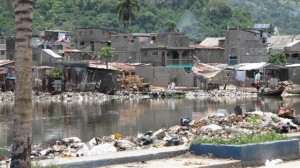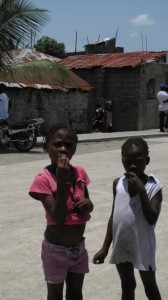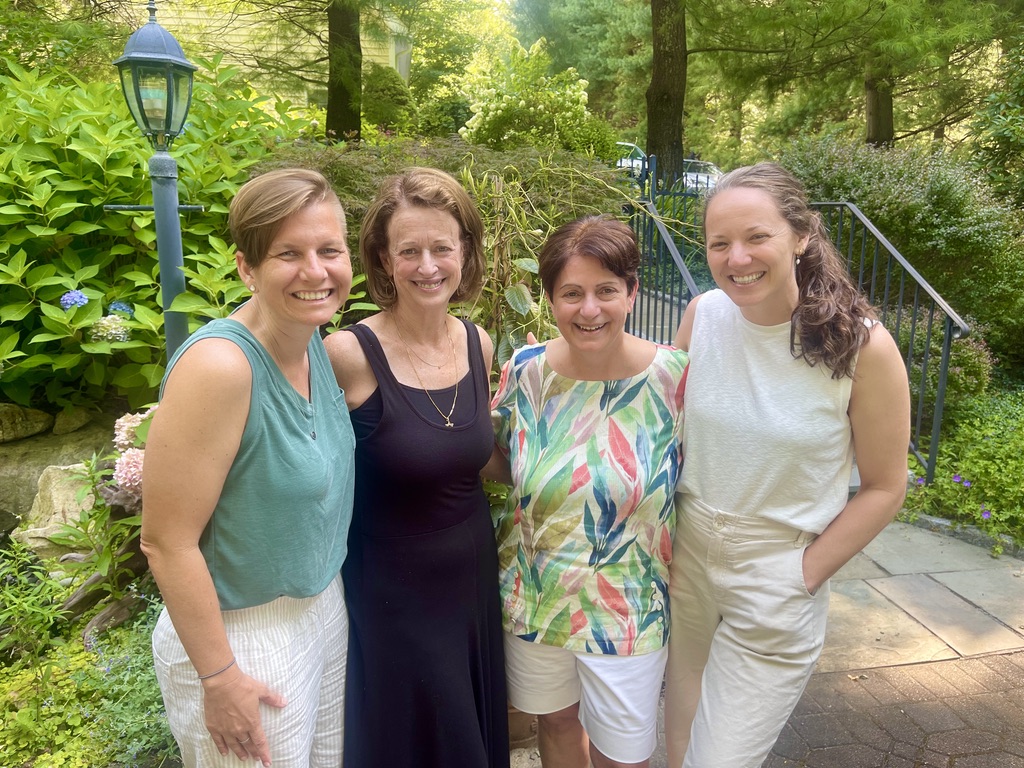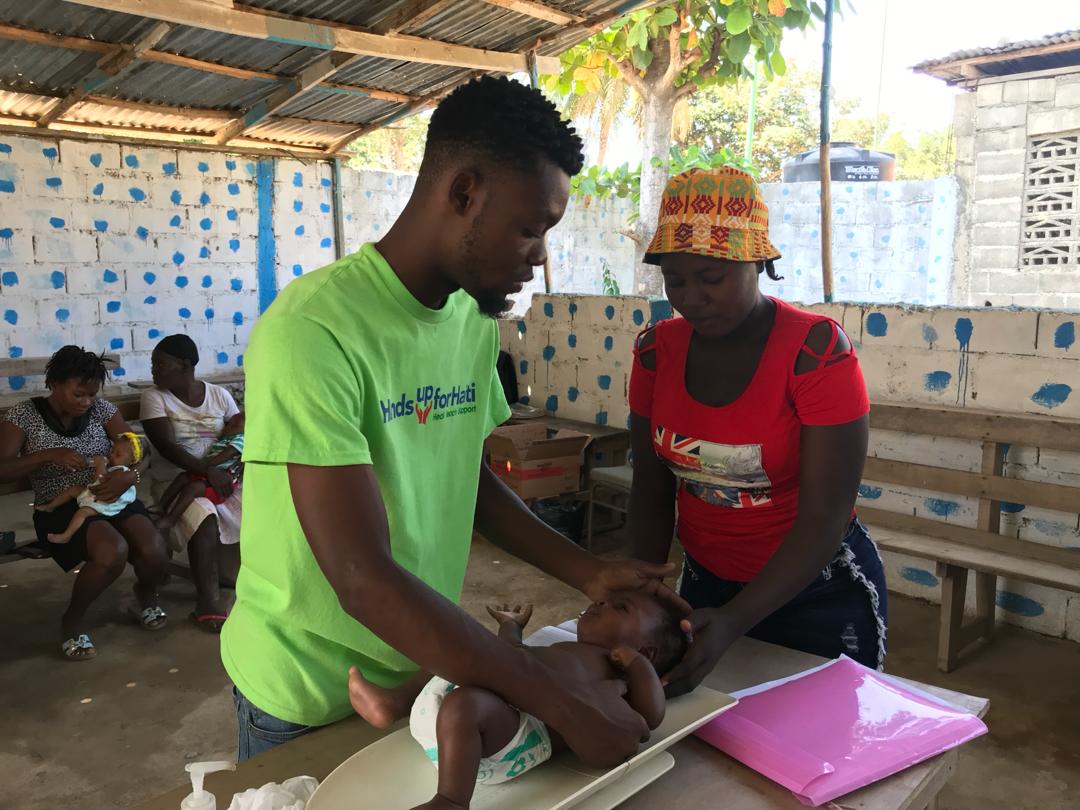By Mary Ann LoFrumento
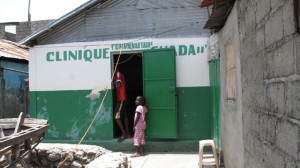
This was not my first time in Shada. For the past three years, I visited every six months. This trip, we came to hold classes on breastfeeding, childbirth and nutrition. We hadn’t planned to see patients until the next day.
The Clinic de Communitaire de Shada, supported by donations from Hands Up for Haiti, was filled with curious pregnant women and mothers of new babies. They sat packed in one small room that doubles as a waiting area and triage and clinic space when our teams are there.
I was helping nurse Judy McAvoy with breastfeeding consultations in the small back office of the clinic. “Dokte Mary Ann,” I heard my name called by one of the translators. Madame Bwa, the local midwife and community leader, had a sick baby for me to see. The baby was brought in by his mother and placed on the table scale.
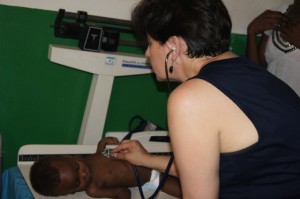
Wasted, severely malnourished, dehydrated and in heart failure, the baby did not respond to my vigorous touching and prodding. Sad, lethargic eyes stared at me as I examined him. It was hard to determine the age by exam, but the mother said he was about 11 months old. She’d breastfed him for the first 9 months and then she had to go away, and left him with the father. She thought they tried to give him milk but he vomited it and so they stopped. She didn’t know what they tried to feed him. Only that she returned after two months and found him so weak he couldn’t drink or eat.
I placed my hand on his belly and felt his liver edge. It was several centimeters below the rib cage, a sure sign of congestive heart failure. His pulse was very slow and weak. As I checked his vitals and watched his pale face, my brain tried to diagnose the problem. Was the baby anemic and therefore the heart was working harder to pump adequate oxygenated blood, forcing the heart into failure? Or was there a birth defect in the heart weakening the child who then did not have the energy to eat?
Never had I felt so useless as a physician. I frantically asked if anyone had Gatorade. Perhaps we could put a tube into his belly and get him some hydration. No one had a drink and, in fact, we didn’t even have a tube. In the US, this baby would have received an emergency IV and been pumped with life-saving fluids. An X-ray would have been done to determine if there was any pneumonia or congestive heart failure. Blood work would tell us the state of his electrolytes and if he was anemic.
We had nothing to help this poor infant. I turned to the translator and said, “The baby has to go to the hospital. We can’t do anything here.” I was told the mother had no money for transportation and no money to pay for any care at the hospital. Even public hospitals require patients to pay, even in emergencies. “If the baby does not get to a hospital, the baby will die.”
Last year, Hands Up for Haiti was fortunate to have a small SUV donated for our teams in Haiti. It is how we move from one place to the next and also how our in-country team carries supplies back and forth from our storage area. Tiroro, our in-country team coordinator and driver, immediately got the car and we drove mother and baby through the congested streets of Cap Haitien. Tiroro turned our car into an ambulance, with continuous horn to get people and motos and tap taps out of the way. It probably took only 15 minutes, but it seemed like an eternity. I tried to reassure this young mother, but her look of blank resignation told me she knew that the baby might die.
We arrived at Justinien Hospital where Hands Up for Haiti has established excellent working arrangements for the teaching of neonatologists, urologists, opthalmalogists, and obstetricians. These connections paid off immediately as we ran into one of the doctors we knew. He called for the Pediatric doctor and the baby was carried in. We also provided the mother with some funds to pay the expenses.
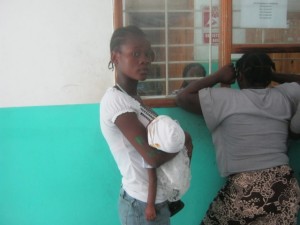
It was just one baby. One life. We were there. How could we ignore the situation? It must happen every day. Many mothers, like this one, have no resources. Often they wait too long and then it is too late to get help for a sick baby.
The situation has haunted me since my return. A heroic moment for our team, but not enough to turn the tide.
We must work harder to create a more sustainable health system for the people of Haiti. Sanitation, clean water, and food security remain major problems in Shada and many areas of northern Haiti where we work. Access to education and healthcare is still a challenge for the majority of the population.
Our commitment to the people of Haiti has not lessened. Hands Up for Haiti has worked to renovate facilities and upgrade the medical services provided to the people. Training Madame Bwa and her assistants in Helping Babies Breathe has helped newborn babies in that important first moment of life. Every mother we give a birthing kit to and educate about childbirth may help save her life and her newborn. Every mother we educate about the importance of breastfeeding throughout the first year of life will help prevent another baby from becoming so ill. And our ongoing support for programs such as the Medika Mumba Malnutrition Program at Shada helps ensure that these babies do not get to a critical state.
This infant survived for today. But as with everything in Haiti, there are no guarantees for the future. It is easy to get discouraged, but we are committed to continuing our efforts to make a difference in the lives of the children who live in Shada and the surrounding neighborhoods.
